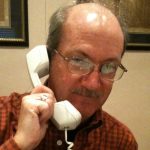Hello, Rick here
The Minka Scholarship Program is part of the FHL Foundation’s giving program and has the following purpose:
To provide scholarship grants designed to help the graduate student map out his or her plan for the future as a field scientist
The Minka Scholarship Program is named for the boat my grandfather, Frederick H. Leonhardt, co-owned with his business partner F. E. Watermeyer. The Minka is shown above. My grandfather enjoyed many happy hours cruising Long Island Sound and the picturesque Hudson. My father—also Frederick H. Leonhardt—would tell me that my grandfather enjoyed his time on the Minka because it allowed him to get away from the hustle bustle of the city, and to think clearly about plans for the future of the company he ran, Fritzsche Brothers, a company that manufactured and distributed flavors and fragrances worldwide. I have no proof but I like to think that it was a cruise on the Minka that resulted in my grandfather starting the FHL Foundation in 1953. My grandfather loved the outdoors, as did my father, and truly was a field scientist. Consider this quote from the 1954 testimonial honoring my grandfather’s sixty years of service to Fritzsche Brothers:
In the late 20’s, the company inaugurated its first field studies of flower and essential oil production in Europe, which ultimately was to embrace—with few exceptions—producing regions in every country of the globe. This work, unique in the annals of American industry, gained its greatest impetus under the encouraging direction of Mr. Leonhardt. There could be no greater testament to one man’s foresight and good judgment than the prodigious six volumes, “The Essential Oils” which was the crowning result of this work and which Dr. Ernest Guenther, its author, dedicates in these words: “To Frederick H. Leonhardt … whose vision and generosity made this work possible. ”
The Minka Scholarship Program provides scholarship grants that are career specific—awards to students who plan to pursue a career in one of the field sciences. Field science includes but is not limited to field geology, field geophysics, environmental science, field biology, marine biology, archaeology, anthropology, field studies in sociology, and field studies in psychology. Other areas of study that typically have a field focus are urban planning, rural medicine, and civil engineering. In essence, we would like to support field-based STEM (science, technology, engineering, and math) as opposed to lab-based STEM, although both fall on a continuum.
If you are uncertain about whether your degree program or project qualifies as a field science, feel free to submit a prequalification form. It’s entirely possible that a typically non-field program (say, computer science) could have a field component (say, a specialty in writing programming for small wind turbine parks or farms). The field component would have to be demonstrably over 50% for any proposed program of study. The information submitted will only be used to assess whether your current or intended program or project qualifies as a field science. The information submitted will have no bearing on whether your department receives a scholarship grant award.
Click on this link to go to our prequalification form:
For more information on the Minka Scholarship Program, click on the menu items above.


